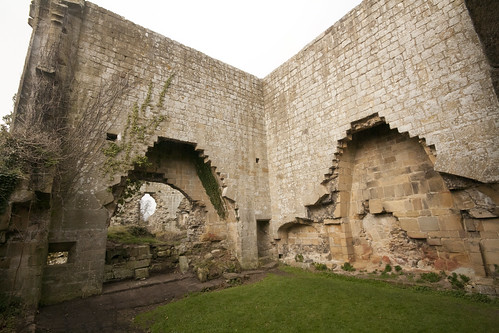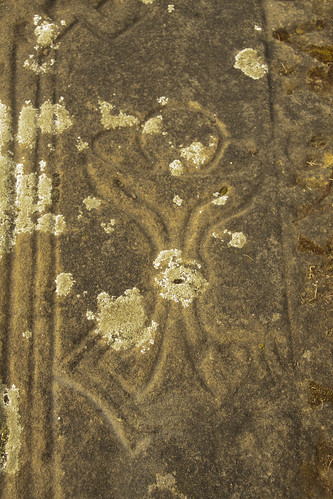Something has to be done to challenge those cardinals, bishops and priests who simply don’t get it. Is an appeal for £500,000 for work on Archbishop’s House, Westminster, and the some £1 million reportedly spent recently on the nunciature, compatible with the example Francis wants to “send ... to other cardinals, bishops and priests” when he lives in a clergy hostel? Are Eminences, Graces, Lordships and Monsignori admissible as titles, when Francis has renounced virtually every title except Bishop of Rome?
 |
| The Chapter House of Fountains Abbey, Yorkshire: Loftus would like to see the residence of the Archbishops of Westminster more like this. |
How should we address Monsignor Basil Loftus henceforth? Fr Loftus? Mr Loftus? Sirrah? Maybe just 'Oi you!'. Out of respect for his exalted rank as a Minor Prelate, I will of course from now on, in accord with his expressed preferences, stop referring to him as 'Monsignor'. I'll stick to the nobly simple, unadorned surname: Loftus.
He's on fine form this weekend, attacking Bishop Mark Davies, the Nuncio, and Archbishop Nichols in The Tablet, and attacking Bishop Egan in the Catholic Times. I suppose, for the Nuncio and Archbishop Nichols, he thinks they should let their historic residences fall into ruins around their ears, contrary to their obligations as custodians of listed buildings. The crimes of Bishop Davis and Bishop Egan are more ideological.
Loftus says that a sermon of Bishop Davis 'may even call for anger'. I wonder whether Loftus has read Bishop Davies' sermon, which is available in full here; it was given to the Union of Catholic Mothers. Perhaps this was the bit that really got under his skin:
[T]the Christian simplicity we see in Pope Francis leads us, not towards abandoning the demands of the Catholic faith, as some commentators might hope or suppose, but directly to those demands in their most radical, beautiful and uncompromising essence.
 |
| Kitchens at Jervaulx Abbey, Yorkshire. Not much soup for the poor gets cooked here these days. |
It is not difficult to quote Pope Francis in support of this interpretation, as Bishop Davies goes on to do. Loftus wants us to fixate, instead, on his choice of footwear. I'm not exagerating: Loftus fulminates about
Francis’ example of evangelical simplicity and poverty, articulated through his far from“irrelevant” footwear...
Those shoes! They are going to lead us to the promised land of dogma-free religion, are they, Basil?
Bishop Egan's error was to refer to Pope Benedict without being rude. This seems to annoy Loftus so much that he's bringing up this example even though it is from more than three months ago - Loftus has gone through his back copies of The Tablet to find this:
 |
| Fountains Abbey Church, from the East end. How Loftus would like all our churches to look, perhaps. |
What, exactly, is wrong with this? Loftus contrasts it with the criticism of the false, or merely human, feeling of security of a non-evangelistic attitude which was recently made by Pope Francis. 'The Holy Spirit is more demanding because ... it does not give us that human security.'
What's the point here? Loftus' presentation of the quotations suggests that Pope Francis is condemning an attitude of Bishop Egan, and even of Pope Benedict. That is both deeply uncharitably and deeply dishonest. Clearly the kind of security Bishop Egan is talking about is not the kind of security Pope Francis is setting aside. A moment's reflection on the Pontificate of Pope Benedict does not suggest that he was someone who played it safe, who didn't step outside the comfort zone of the people around him when he thought that doing so was an evangelical imperative. (Regensburg? Summorum Pontificum? Anglicanorum coetibus?) As for Bishop Egan, he was writing during the period of Sede Vacante, and his column on the qualities needed by a new Pope was well summarised by the Tablet's headline: 'Combine the energetic creativity of John Paul with the prayerful fidelity of Benedict'.
Loftus is just making trouble here: it is nothing more than malicious mischief-making. The rest of the Catholic Times column is devoted to a rambling reminiscence of the bad old days, including the utterly preposterous claim that
Theologically, no progress was being made at all. The lectures I attended at Rome's Gregorian University in the 1950s in no way differed from those given four centuries earlier.
 |
| The theology of the Eucharist expressed on the tomb of a medieval Abbot of Jervaux: not something which has changed |
Not that these developments were incompatible with the teaching of the Council of Trent. Like Trent itself, they represent an unfolding of the implications of the Deposit of Faith given to the Church by Christ. This was real 'progress': not like the kind of 'progress' proposed by the hero of this article, the modernist von Hugel.
Watch out, Loftus! von Hugel, perhaps unlike you, accepted the condemnation of modernism by Pius X, and in his twilight years scandalised his modernist friends by his devotion to the Rosary. Loftus' readers should pray that something similar happen to him.
But come back tomorrow and I'll have something to say about Loftus' very interesting attitude to the doctrine of the Resurrection of Our Lord.
Errr.... Dogma of the Assumption was in 1950. I well remember the worldwide vigils and processions on evening before promulgation
ReplyDeleteand err.....Dogma of Immaculate Conception was declared in 1854.....before my time!
ReplyDelete"Even Homer....." comes to mind.
Oops! Corrected.
ReplyDeleteHow are you corrected? You were claiming that the memory of[Mgr?] Loftus was playing tricks on him when he recalled that the lectures he attended at the Gregorian University hadn't changed since the Council of Trent not that his memory had failed him on the events of the 1854 and 1950.
ReplyDelete"Sir Basil Loftus", prior to the Reformation, would have been the title in England of an uneducated man (called Basil Loftus) who had been ordained (cf Sir John Lacklatin). "Sir" wouldn't have carried the same sense of respect and awe as it might today.
ReplyDelete"Sir Basil" ...